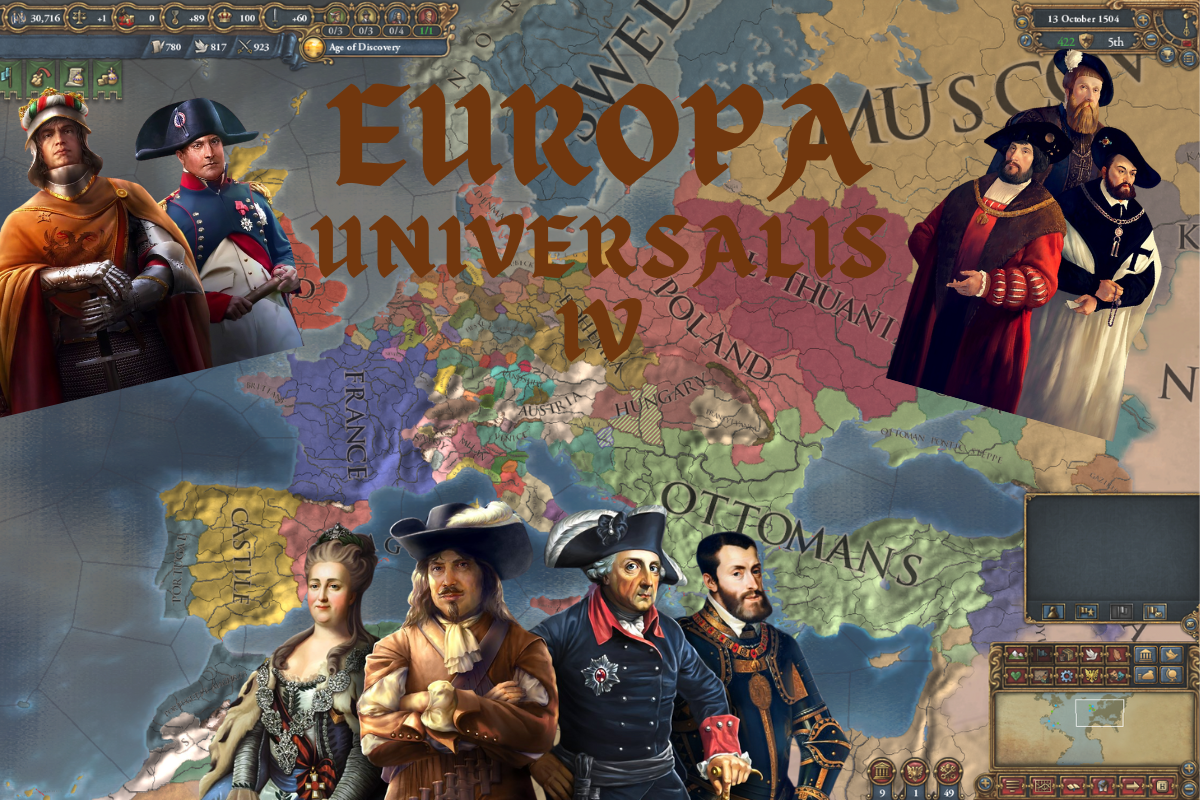Embark on an epic journey through time with “Europa Universalis 4: A Strategy Gamer’s Haven or a Daunting Challenge?” Whether you’re a history aficionado, a strategy game enthusiast, or someone looking to delve into the grand strategy genre, this guide is your first step into the expansive universe of Europa Universalis 4 (EU4). Crafted with care by Paradox Interactive, EU4 stands as a monumental offering in the world of strategy games, blending deep historical content with complex strategic gameplay.
This article is your compass in navigating the vast seas of EU4, from its intricate diplomacy and economic systems to the thrill of exploration and the depth of military conquest. We’ll decode the complexities that make EU4 both a paradise for strategy lovers and a challenging frontier for newcomers. Ready to discover what makes Europa Universalis 4 a gold standard in grand strategy gaming? Let’s set sail into the heart of this gaming masterpiece.
Europa Universalis 4: A Gold Standard of Grand Strategy
Europa Universalis 4 is not just a game; it’s a tapestry of history, strategy, and diplomacy, woven into a grand strategy genre within a simulated environment. Developed by Paradox Interactive, EU4 is a testament to the depth and complexity that a video game can offer. But what exactly makes it stand out in the crowded world of strategy games? Let’s break it down.
Genre and Gameplay Style
At its core, EU4 is a grand strategy game. This genre is characterized by its focus on long-term planning and strategic management over large-scale maps. In EU4, you control a nation from the late Middle Ages through the early modern period (1444 to 1821). This era spans significant historical events, from the fall of Constantinople to the French Revolution.
Unlike other strategy games that might focus on individual battles or short-term tactics, EU4 emphasizes a broader perspective. You’re not just a general or a king; you’re the guiding force behind an entire nation’s destiny. Europa Universalis 4 goes beyond traditional strategy game mechanics by incorporating detailed simulation elements that bring the historical period to life. This blend of grand strategy and simulation creates a dynamic, living world where every decision impacts the game’s complex systems. Due to the simulated experience the game offers each new game presents its own unique challenges as nations evolve & devolve around you.
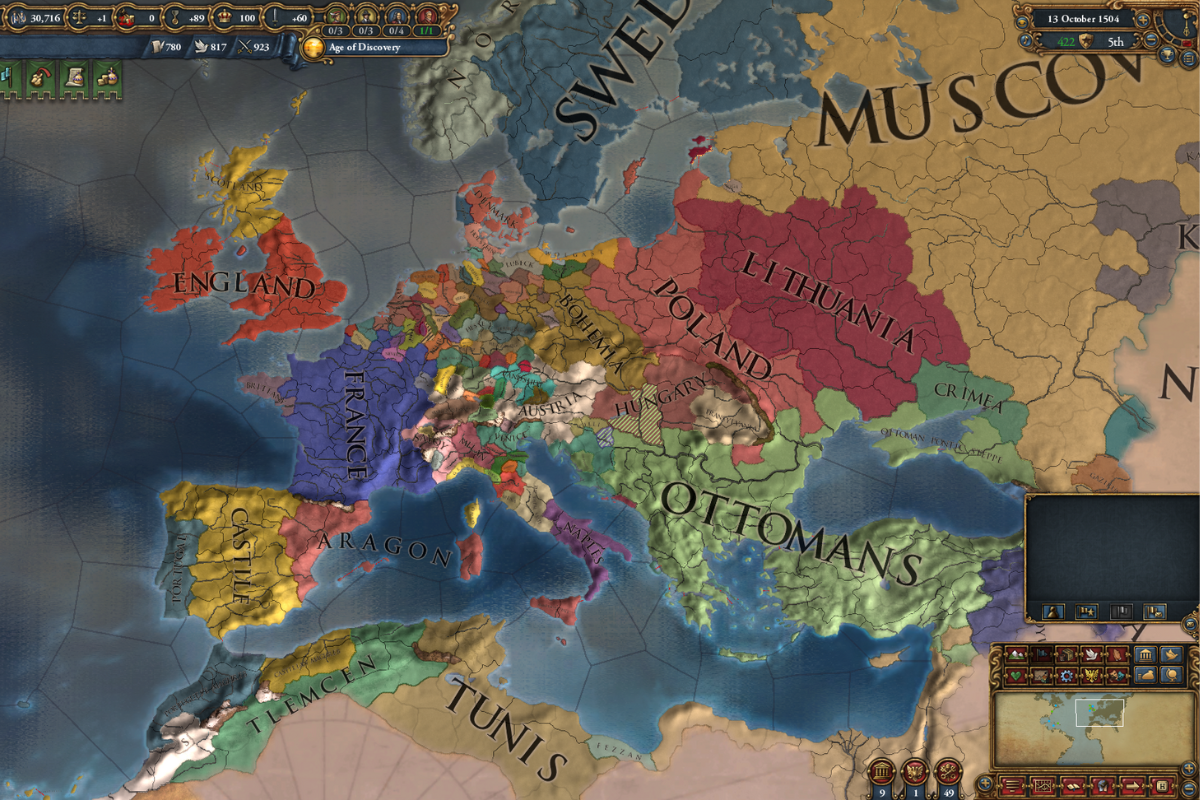
Depth of Diplomacy and Politics
EU4 stands out for its incredibly detailed diplomatic and political systems. You engage in intricate diplomacy with hundreds of other nations, each with its own goals and personality. The game simulates historical rivalries, alliances, and conflicts, allowing you to rewrite history in your own way.
Diplomacy in EU4 isn’t just about war and peace. It involves marriage alliances, trade agreements, espionage, and even the support of rebels in foreign lands. The political aspect also plays a huge role. Inside your nation, you manage different factions, deal with rebellious estates, and navigate the complexities of court intrigue.
Economic and Trade Management
The economic system in EU4 is robust and multifaceted. You manage your nation’s economy, balancing income from taxes, trade, and production. Trade is a particularly dynamic aspect of the game. You compete for control of trade routes, establish global trade empires, and manipulate the flow of goods to enrich your treasury.
The economic system in EU4 attempts to replicate the complexities of global trade, resource management, and the economic impact of policies and decisions. Population demographics, including religious and cultural differences, also play a role, affecting everything from internal stability to diplomatic relations. This level of detail ensures that players must consider a wide range of factors in their strategy, from the granular management of provinces to the global economic landscape.
There are a few improvements to be made to the economic & trade systems in EU4 but overall the game provides a challenging but manageable task to its players. The systems definitely come with a steep learning curve for new players.
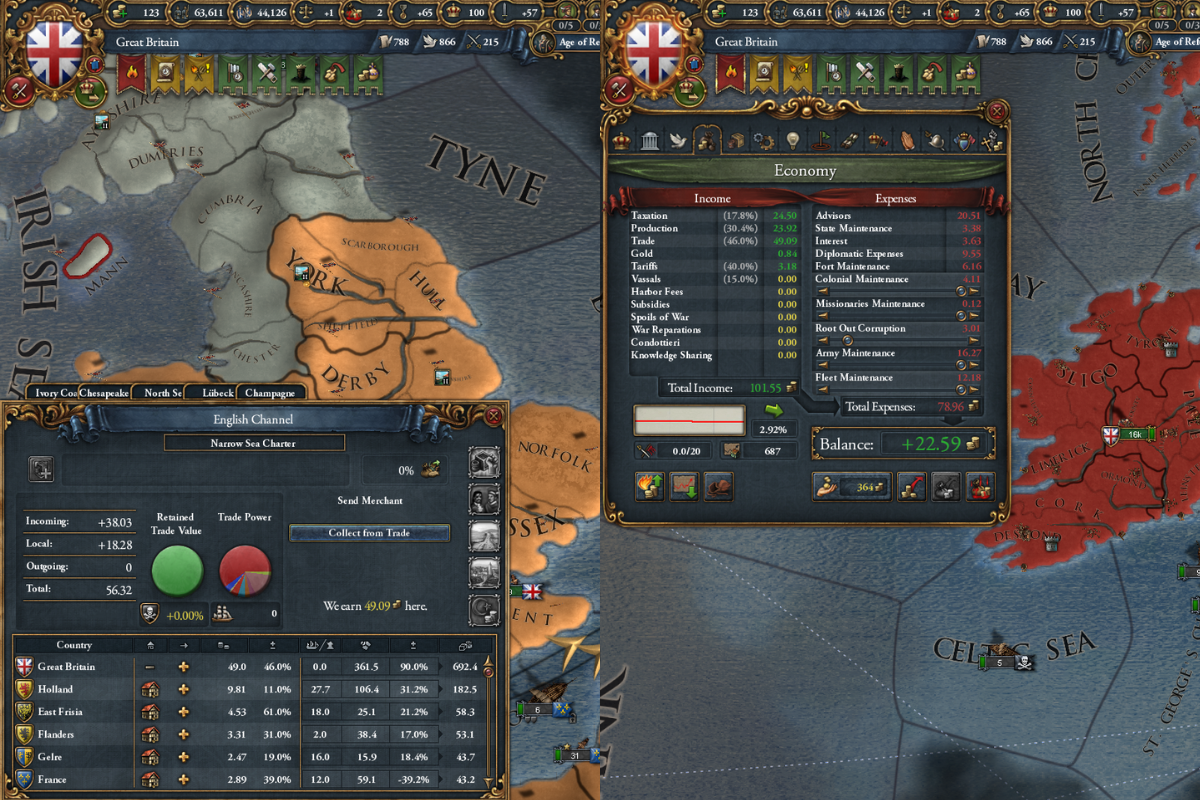
Military & Warfare
Military strategy in EU4 is as complex as you would expect from a grand strategy game. It involves not just deploying armies and fighting battles but also managing logistics, technology, and naval power. The game simulates different military units from different cultures and eras, each with its strengths and weaknesses.
Sieges, blockades, and terrain all play critical roles in warfare. The game also factors in morale, discipline, and military technology, making each conflict a unique challenge. The player has direct control over moving their units between provinces (or sea tiles for naval units). Each land terrain type may have combat modifiers for defenders and the game calculates certain defensive advantages like river crossings.
You defend not only with military units but also forts built in provinces of your choice. Each fort has a zone of control over all adjacent provinces which adds more complexity and nuances to fort placement.
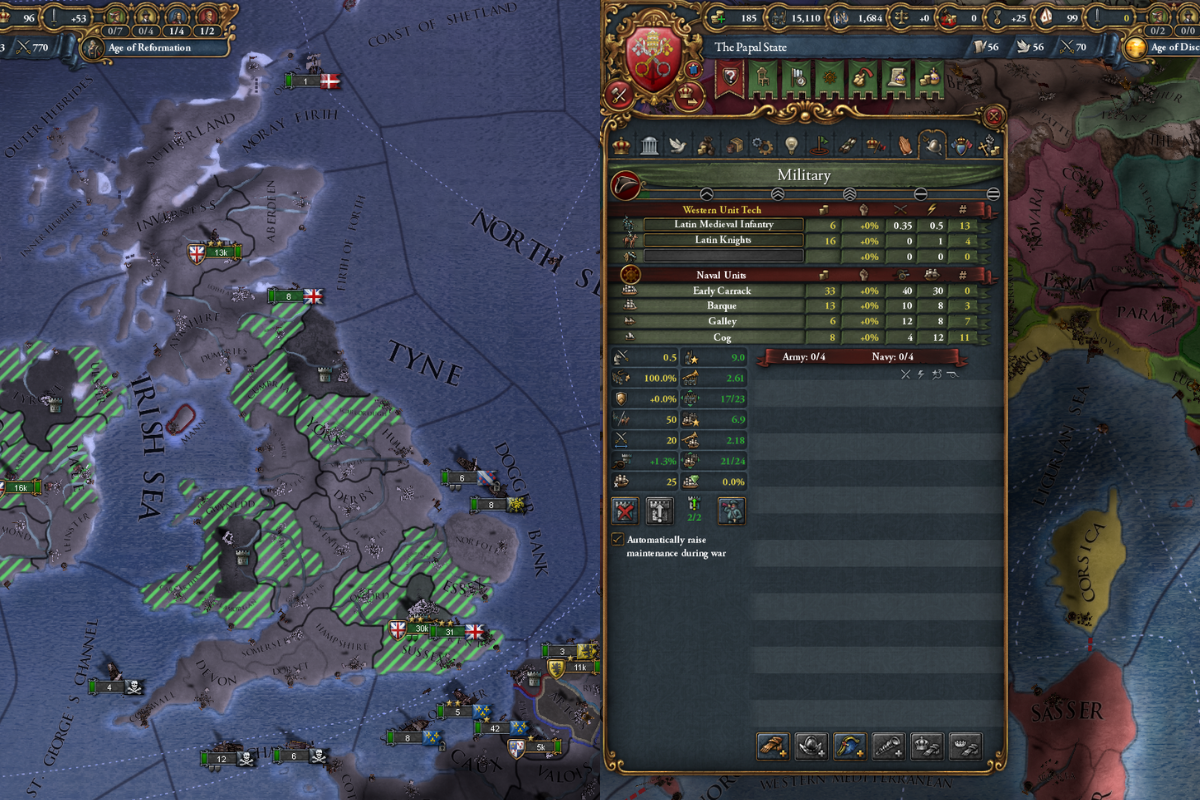
Cultural and Religious Dynamics
In EU4, culture is not just a backdrop; it’s a dynamic force that influences diplomacy, governance, and identity. Each nation in the game is characterized by its primary culture, which belongs to one of several cultural groups. This system reflects the historical ethno-linguistic composition of the world during the early modern period.
Cultural unity within a nation is crucial for stability. Provinces that share the same culture as their ruling nation are more loyal and productive. Conversely, provinces with different cultures can become sources of unrest and rebellion. Players must navigate these cultural dynamics carefully, deciding whether to assimilate divergent cultures through policies and decisions, or even promote a minority culture to a more dominant position within the empire.
The strategic depth comes from managing these cultural differences, balancing the benefits of a diverse empire against the challenges it poses. Cultural policies, such as promoting cultural acceptance or enforcing cultural conversion, require careful consideration and resources, adding another layer of strategy to the game’s governance.
Religion in EU4 is a powerful and multifaceted element that affects almost every aspect of gameplay. The game features a wide array of religions, from global faiths like Christianity, Islam, and Buddhism to more localized beliefs. Each religion comes with its unique mechanics, benefits, and challenges, influencing diplomacy, internal politics, and social cohesion.
Religious tolerance is a critical concept in EU4. Nations must manage the delicate balance between the state religion and the presence of other faiths within their borders. High religious tolerance can lead to a peaceful coexistence, enhancing stability and reducing unrest.
Religious conflicts, both internal and external, are common in EU4. The game simulates periods of religious turmoil, such as the Protestant Reformation and the conflicts it spawned. Players can find themselves at the center of religious wars, facing both external aggression and internal strife. Managing these conflicts requires a blend of military might, diplomatic negotiation, and religious conversion efforts.
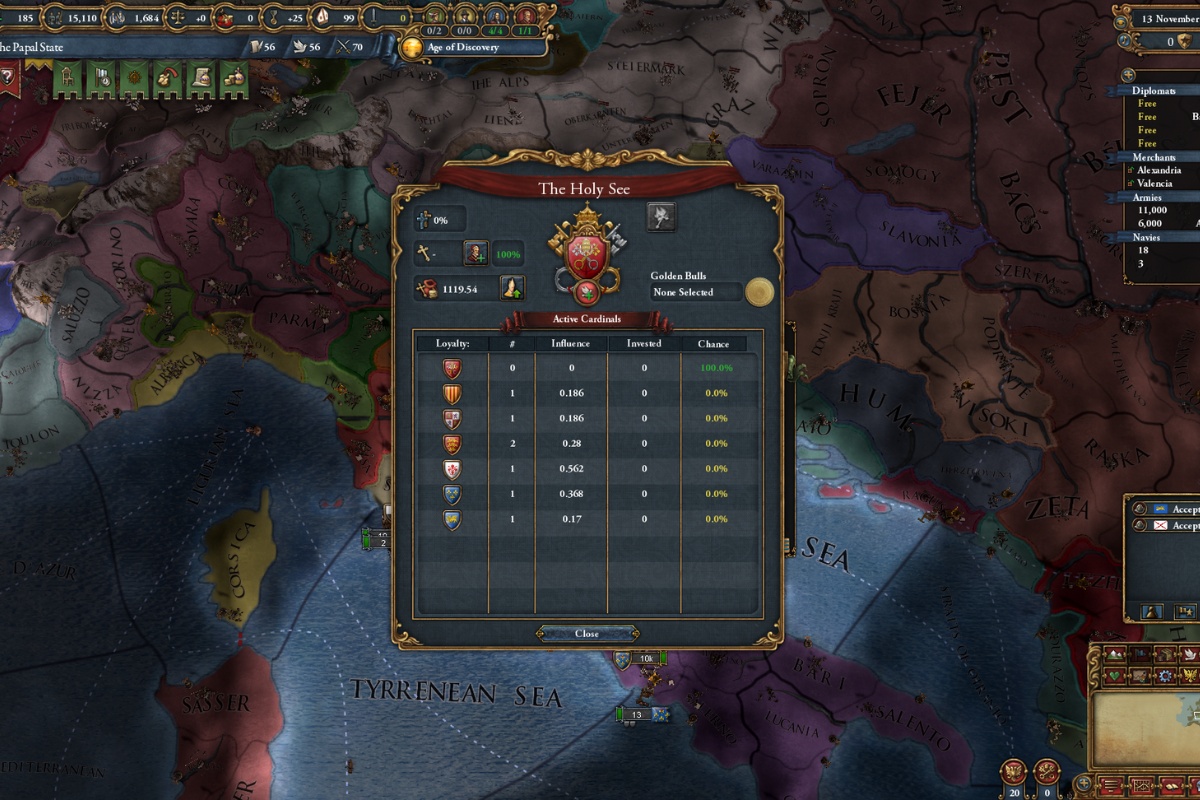
Religious institutions, such as the Papacy for Catholic nations or the Caliphate for Muslim nations, add another layer of depth to the game’s religious system. These institutions offer unique benefits, from declaring crusades to issuing religious edicts. Players can interact with these institutions to gain spiritual and temporal advantages, influencing the religious landscape of the game.
Exploration and Colonization
In the vast, intricate world of Europa Universalis 4, exploration and colonization represent key strategies for expanding your empire and asserting your dominance on the global stage. This facet of the game not only mirrors the historical age of exploration but also offers players the chance to rewrite history in their own image.
The exploration system in EU4 is designed to emulate the suspense and uncertainty of the 15th to 18th centuries’ great explorations. Players start with a map that is partially obscured by a “fog of war,” representing unexplored territories. To discover new lands and sea routes, players must commission explorers and conquistadors, assign them to fleets or armies, and send them into these unknown regions.
As explorers venture into uncharted territories, they reveal not only new lands but also potential new trade routes and resources. These discoveries can lead to the establishment of new colonies, trade posts, and the encounter with native populations. The interactions with indigenous peoples are multifaceted; players can choose to conquer, coexist, or assimilate, each choice having its own set of challenges and benefits.
Colonization in EU4 is not merely about claiming land; it’s a strategic endeavor that requires careful planning and resource management. Players must decide where to colonize based on strategic importance, resource availability, and geographical advantages. Establishing a colony involves sending settlers, managing the colony’s growth, and defending it from rival nations and indigenous resistance.
The colonization process also affects the global balance of power. Successful colonization can enhance a nation’s economic strength, military reach, and influence. However, it also requires protection and maintenance, drawing resources away from other areas of your empire.
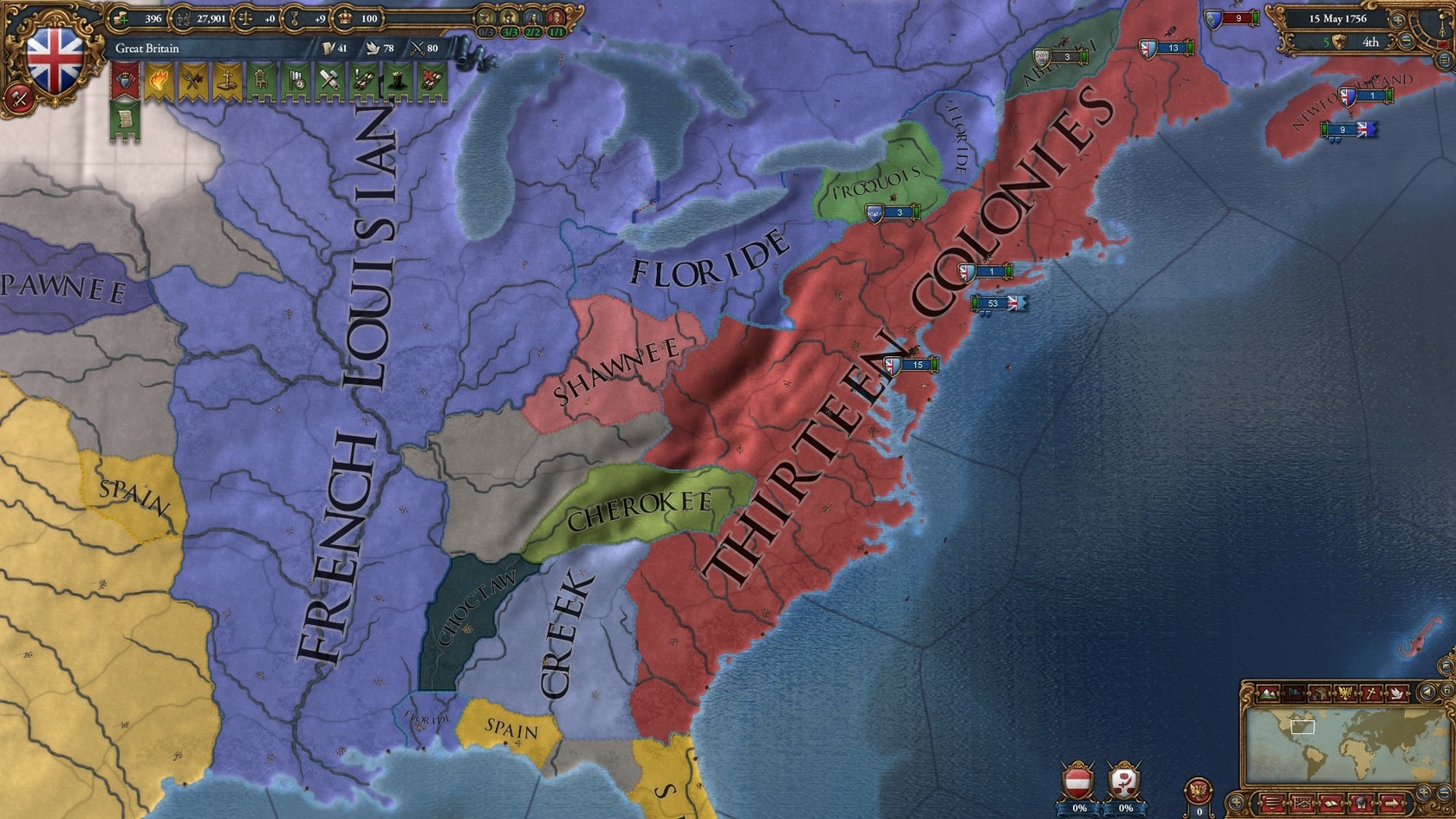
The economic implications of exploration and colonization are profound in EU4. Discovering and controlling key trade nodes and resources can dramatically shift the wealth and power dynamics between nations. Players can establish trade companies in foreign lands, monopolize resources like gold and spices, and create vast trade empires that span the globe.
Exploration and colonization in EU4 also have long-term effects on the world’s political and cultural landscape. The spread of religions, the exchange of cultures, and even the ecological impact of colonization are simulated, affecting the global history narrative that each player creates.
Modding and Community Involvement
The modding community and the broader Europa Universalis 4 (EU4) player base are central to the game’s enduring popularity and its evolving gameplay experience. This vibrant community not only enhances the game through mods but also creates a rich tapestry of shared knowledge, strategies, and historical insights.
The modding community of EU4 is incredibly active and diverse. Mods range from small tweaks and graphical enhancements to complete overhauls that can change the game’s mechanics, visuals, and historical scenarios.
Mods significantly enhance the replayability of EU4 by offering fresh perspectives and challenges. They allow players to customize their gaming experience to match their interests, whether they’re looking for more historical realism, fantasy adventures, or just improved gameplay mechanics. The modding community continually breathes new life into the game, ensuring that it remains engaging years after its release.
Types of Mods:
Historical Accuracy Mods: These mods aim to refine the game’s historical simulation, adjusting timelines, borders, and events to reflect historical records more accurately. They are perfect for history buffs looking for an even more immersive experience.
Alternate History and Fantasy Mods: Some mods explore historical what-ifs or completely fictional universes, offering players new worlds to conquer. These can range from subtle changes, like a stronger Byzantine Empire, to entirely new settings, like fantasy realms.
Gameplay Enhancement Mods: These mods focus on improving the game’s mechanics, user interface, and graphics. They can make the game more accessible to newcomers or add complexity for veterans seeking a new challenge.
Total Conversion Mods: Arguably the most ambitious, these mods completely transform the game, changing nearly every aspect of gameplay and setting. They can transport players to entirely different eras or fictional worlds.
Drawing upon the expansive journey through the realms of Europa Universalis 4, it’s clear that this grand strategy game offers an unparalleled depth of gameplay, historical immersion, and player engagement. From the intricate diplomacy and complex economic systems to the strategic military operations and the vibrant tapestry of cultures and religions, EU4 is a game that challenges the mind and ignites the imagination.
A Living, Breathing Historical Simulation
At its core, EU4 is more than just a game; it’s a simulation of history itself, allowing players to experience the thrill of exploration, the challenges of empire-building, and the nuances of diplomacy. The game’s commitment to historical accuracy and detail provides a rich educational experience, offering insights into the complexities of global history and the interplay of various forces that have shaped our world.
The vitality of EU4’s modding community and the broader player base cannot be overstated. Through their creativity and collaboration, they have significantly extended the game’s lifespan and enhanced its replayability. The mods introduce new scenarios, improved mechanics, and even entire worlds, ensuring that EU4 remains fresh and engaging.
Europa Universalis 4 stands as a testament to the enduring appeal of grand strategy games. It offers a sandbox of possibilities where players can rewrite history, forge mighty empires, and leave their mark on the world. The game’s complexity and scale might seem daunting at first, but they are also what make it so rewarding. Each decision, from the tactical to the diplomatic, feels impactful, contributing to a narrative that is uniquely yours.
Europa Universalis 4, with its blend of historical depth, strategic complexity, and community-driven evolution, remains a pinnacle of the grand strategy genre, inviting players to embark on a journey that is as intellectually rewarding as it is endlessly entertaining.
Did you enjoy this introductory deep dive into EU4? This is just the beginning! To keep up with the latest strategies, historical insights, and community highlights from the world of EU4 and beyond, make sure you subscribe to our YouTube channel. We share in-depth guides, gameplay tips, and much more, crafted especially for strategy enthusiasts like you.
But why stop there? Join our mailing list to get exclusive updates, behind-the-scenes content, and special offers directly to your inbox. Be the first to know about new mods, game updates, and community events that will keep you at the forefront of the EU4 world.
Don’t miss out on the next chapter of our grand strategy journey. Subscribe and join our mailing list today! Your empire awaits.


